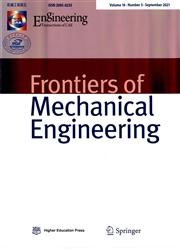Molecular dynamics simulation of frictional properties of Pt cluster on graphite under load
IF 4
2区 工程技术
Q1 ENGINEERING, MECHANICAL
引用次数: 0
Abstract
Structural lubricity, characterized by nearly frictionless behavior at solid incommensurate interfaces with weak interactions, holds significant technological importance. However, various factors can lead to the breakdown of structural lubricity, such as spontaneous reorientation to a commensurate state, applied load, edge effects, deformations, and wear. To overcome these challenges, clusters can be employed at interfaces. With their high Young’s modulus and stiffness, clusters can withstand high loads and tolerate elastic deformations. Therefore, Pt cluster, which inherently possess incommensurate contact with graphite surface, are expected to exhibit structural superlubric behavior, even under high loads, as long as they can sustain incommensurate contact. Our molecular dynamics (MD) simulations, however, have revealed that a Pt cluster on graphite can undergo metastable transitions from the incommensurate state to a commensurate state, resulting in subsequent stick-slip behavior. In the absence of any external load, the Pt cluster has demonstrated the ability to maintain incommensurate contact with almost zero friction force, primarily attributed to its weak interaction with graphite. However, the presence of an applied load force leads to the loss of the initial incommensurate contact between the Pt cluster and graphite, resulting in the emergence of high friction forces and the breakdown of structural lubricity with a similar stick-slip behavior to that observed in the comparative simulations conducted for the commensurate state. It becomes evident that the maintenance of incommensurate contact is crucial for achieving superlubric behavior in Pt cluster-graphite systems, while the presence of an applied load force can disrupt this behavior and lead to higher friction forces.负载下石墨上铂团簇摩擦性能的分子动力学模拟
结构润滑的特点是在具有弱相互作用的固体不相称界面上几乎无摩擦,具有重要的技术意义。然而,各种因素可能导致结构润滑性的破坏,例如自发重新定向到相称的状态、外加载荷、边缘效应、变形和磨损。为了克服这些挑战,可以在接口上使用集群。凭借其高杨氏模量和刚度,团簇可以承受高载荷和容忍弹性变形。因此,Pt团簇本身具有与石墨表面不相称的接触,即使在高负荷下,只要它们能够维持不相称的接触,也有望表现出结构超润滑行为。然而,我们的分子动力学(MD)模拟表明,石墨上的铂团簇可以经历亚稳态从不相称态到相称态的转变,从而导致随后的粘滑行为。在没有任何外部负载的情况下,Pt簇已经证明了在几乎为零摩擦力的情况下保持不相称接触的能力,这主要归因于它与石墨的弱相互作用。然而,负载力的存在导致Pt团簇和石墨之间初始不相称接触的丧失,导致高摩擦力的出现和结构润滑的破坏,其粘滑行为与在相称状态下进行的比较模拟中观察到的相似。很明显,维持不相称的接触对于实现Pt团簇-石墨体系的超润滑行为至关重要,而施加负载力的存在会破坏这种行为并导致更高的摩擦力。
本文章由计算机程序翻译,如有差异,请以英文原文为准。
求助全文
约1分钟内获得全文
求助全文
来源期刊

Frontiers of Mechanical Engineering
Engineering-Mechanical Engineering
CiteScore
7.20
自引率
6.70%
发文量
731
期刊介绍:
Frontiers of Mechanical Engineering is an international peer-reviewed academic journal sponsored by the Ministry of Education of China. The journal seeks to provide a forum for a broad blend of high-quality academic papers in order to promote rapid communication and exchange between researchers, scientists, and engineers in the field of mechanical engineering. The journal publishes original research articles, review articles and feature articles.
 求助内容:
求助内容: 应助结果提醒方式:
应助结果提醒方式:


